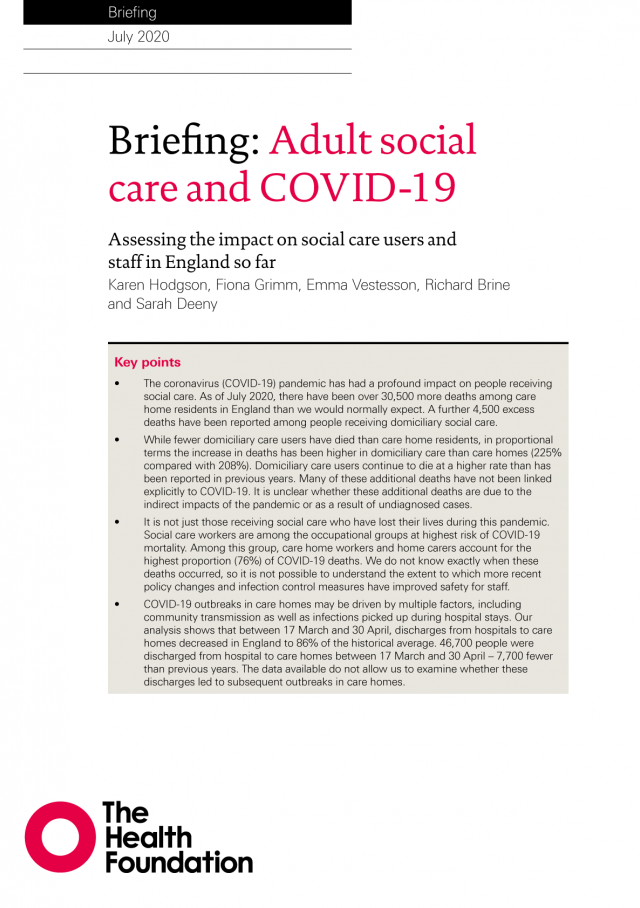Adult social care and COVID-19: Assessing the impact on social care users and staff in England so far Our analysis on the scale of the impact of COVID-19 on social care in England during the first phase of the pandemic
July 2020

Key points
- The coronavirus (COVID-19) pandemic has had a profound impact on people receiving and providing social care in England. Since March, there have been more than 30,500 deaths among care home residents than we would normally expect, and a further 4,500 excess deaths among people receiving care in their own homes (domiciliary care).
- There has been a greater proportional increase in deaths among domiciliary care users than in care homes (225% compared to 208%). And while deaths in care homes have now returned to average levels for this time of year, the latest data (up until 19 June) shows that there have continued to be excess deaths reported among domiciliary care users.
- Social care workers are among the occupational groups at highest risk of COVID-19 mortality, with care home workers and home carers accounting for the highest proportion (76%) of COVID-19 deaths within this group.
- During March and April, there was a substantial reduction in hospital admissions among care home residents. Elective admissions reduced to 58% of the 5-year historical average and emergency admissions to 85% of the 5-year historical average. By reducing admissions, care home and NHS teams may have reduced the risk of transmission, but there may have also been an increase in unmet health needs.
- During March and April, discharges from hospitals to residential care homes were 75% of the historical average, while discharges from hospitals to nursing homes increased to 120% of the historical average. These difficult decisions to discharge patients were made in an urgent and uncertain context but may have played a role in transferring risk to a poorly supported social care system
In this briefing we provide an overview of the impact of the COVID-19 pandemic on social care in England. In part 1 we describe how the pandemic unfolded in the social care sector from March until June 2020, and in part 2 we examine the factors that contributed to the scale and severity of outbreaks in care homes. In part 3 we attempt to quantify the disruption to health and social care access from February until the end of April 2020.
We use a mixture of national data sources from England, individual level data from the health care service, and publicly available data reported by Public Health England, Care Quality Commission and Office for National Statistics. We carried out novel descriptive analysis, with all code available and further description of the methods set out in the technical appendix to this briefing.
Our analysis demonstrates the scale of the challenge of keeping people who need social care safe and in providing high-quality health and social care during the pandemic. Long-standing structural issues have exacerbated the crisis in social care and hindered the response to the pandemic. Action is needed now to prevent further harm including by filling the gaps in data, particularly for those receiving domiciliary care, highlighted by our analysis. A new data strategy is needed for social care that first and foremost enables the provision of better care.
Cite this publication
Related downloads
Further reading
Work with us
We look for talented and passionate individuals as everyone at the Health Foundation has an important role to play.
View current vacanciesThe Q community
Q is an initiative connecting people with improvement expertise across the UK.
Find out more


